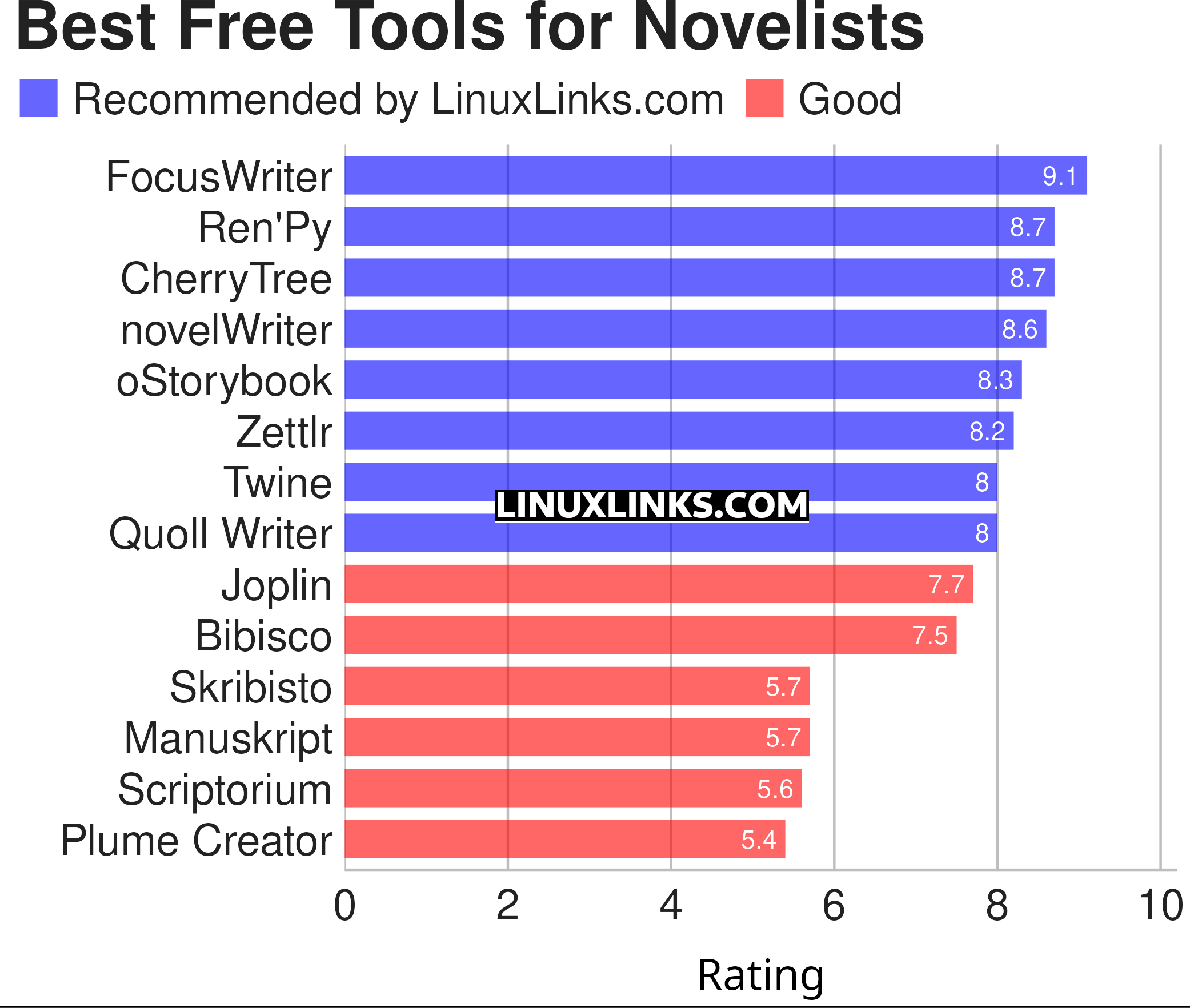Writing is one of the essential skills in modern society. Being able to communicate effectively is paramount both at work and at home. It makes your thinking visible to others, and is the main way in which work, learning, and intellect is judged by others.
At first glance, the trusty word processor might seem a good tool for a novelist. After all, in days gone by, budding authors would tap away using a typewriter, and a word processor is the modern day equivalent. Linux has some excellent word processing software such as LibreOffice. However, word processors are actually not the ideal tool for some forms of writing, particularly novel-writing. In fact, it could be said that using a word processor for novel-writing is a recipe for disaster, and actually a retrograde step from a typewriter. Word processors are a general application software that are perfect for constructing business documents, letters, batch mailings using templates, etc. However, many word processors are too obtrusive and distracting for writers. What is needed is software that helps concentrate on the content of the novel, sketch out the chapters and scenes, work out the best structure, import research, add locations, characters and objects, and so on.
The software featured in this article is designed to meet the specialised needs of a budding novelist. There’s the finest open source distraction-free tools, software designed to create visual novels, and tools to help capture and visualise ideas.
To provide an insight into the quality of software that is available, we have compiled a list of high quality free writing tools. Hopefully, there will be something of interest here for anyone who has a passion for writing novels, including visual novels.

Let’s explore the tools at hand. For each title we have compiled its own portal page, a full description with an in-depth analysis of its features, a screenshot of the software in action, together with links to relevant resources.
| Writing Tools | |
|---|---|
| FocusWriter | Simple, distraction-free word processor |
| Ren'Py | Used to create over a thousand visual novels, games, and other works |
| CherryTree | Hierarchical note taking application packed with features |
| novelWriter | Plain text editor designed for writing novels |
| oStorybook | Offers authors a complete and well integrated tool |
| Zettlr | Markdown editor for the 21st Century |
| Twine | Visual tool for creating interactive stories |
| Quoll Writer | Java tool to help you focus on writing and your words |
| Joplin | Note taking and to-do application with synchronisation capabilities |
| Bibisco | Write your story, in a simple way |
| Skribisto | Born from the ashes of Plume Creator |
| Manuskript | Snowflake method can help you grow your idea into a book |
| Scriptorium | Write short stories and novels |
| Plume Creator | Project manager and rich text editor for writers |
This article has been revamped in line with our recent announcement.
 Read our complete collection of recommended free and open source software. Our curated compilation covers all categories of software. Read our complete collection of recommended free and open source software. Our curated compilation covers all categories of software. Spotted a useful open source Linux program not covered on our site? Please let us know by completing this form. The software collection forms part of our series of informative articles for Linux enthusiasts. There are hundreds of in-depth reviews, open source alternatives to proprietary software from large corporations like Google, Microsoft, Apple, Adobe, IBM, Cisco, Oracle, and Autodesk. There are also fun things to try, hardware, free programming books and tutorials, and much more. |

CherryTree is rated kinda high (and Joplin kinda low) considering that there’s no mobile version of CherryTree right now.
Not certain the lack of a mobile version has much bearing on an article about Linux software.
Thankfully LinuxLinks seems to publish far fewer Android articles these days.
October 12, 2022 at 8:02 am
?…cheeky
Well, I doubt Cherrytree would run on any Linux mobile platform out there e.g Purism’s OS?
And also, availability of good Linux apps on other platforms would increase linux fanbase, as the bane of the low usage of Linux distros on PC’s is not so much of Linux not being a good OS but the lack of standard apps that can compete with, not be like, the defacto commercial ones
Since Cherytree exports to plain text files, you can export to such format, send them to your mobile, then copy/paste to your note taking app…
?…the perks of linux, great options (which sometimes may not be usable), lengthy workflows or rather workarounds…
Where’s Wonderpen?
Not eligible for inclusion as it’s not open source.
That software is junk anyway.
As we all need to export to mobile platforms for our readers, I’m surprised Sigel and Calibre aren’t on the list. I also want to second the statement that Joplin (and also Manuskript) are ranked lower than I would have expected.
Thanks for your input. Let’s go through each of the programs you reference:
To start off, I want to thank you for the article. I love using open source tools and I have written a handful of books over a twenty year period, so when this article came up in my newsfeed, I immediately clicked on it to see if there are additional tools I should be learning to use. There are a couple that I intend to invest time in thanks to your list. It is because the article might attract other authors, established and aspiring, to check out various pieces that I made my comments in the hopes that a couple of pieces of software that I have found useful would not be overlooked.
Second, sorry for misspelling Sigil. My inability to spell is part of why I always hire two editors.
I had mentioned, Sigil and Calibre for their capabilities to create various formats like EPUB, MOBI, AZW, etc. Most indie/self-pub authors (myself included) need to do our own conversions to eBooks, so were not paying someone else every time we find a missing punctuation, incorrectly spelled word, or notice that our pronoun is pointing to the wrong person. It will save those independent authors time and money doing it themselves.
I had mentioned Joplin because taking lots of easily searchable notes is a common task when writing long novels, or series. It helps authors maintain details, preventing large rewrites when editors find continuity errors.
And I don’t want Manuskript simply discarded when new authors see it near the bottom of the list. Mentioning that it uses a snowflake method will mean nothing to many people, meanwhile it is absolutely packed with features and is the only real alternative to Scrivener on the list.
All that said, I often check ratings on your lists when looking for new tools. Your work is, overall, wonderful. Please don’t take my disagreement as an attack, but simply a desire to provide my own differing point of view on this specific topic.
Hi Sean
Thanks for your kind feedback and for taking the time to explain why you mentioned the software in question. That’s really appreciated. Lots of people make comments saying X or Y hasn’t been included, without any real explanation as to why they should be included.
We love compiling open source roundups. Sure they reflect our prejudices but we always try to be fair and impartial. Our other contributors feed into the ratings process. It’s lovely to hear you find them useful. It’s feedback like that that makes it worthwhile.
Please don’t take our rating of Manuskript as a slight. We rated it Good software (as confirmed in the chart’s legend). The choice of open source software that can be used to write a novel is huge, and the vast majority of that software isn’t even mentioned.
I certainly don’t consider your disagreement as an attack. Opinions are neither right nor wrong, and we’re not saying our ratings are always spot on. We revise them regularly in part because new releases can markedly change a program’s usefulness.
As a general observation, we try to take the target audience into account. For example, if the novelist had good Lisp knowledge, we’d have included Org mode for Emacs without hesitation. But given that 99.99% (guess) of novelists have zero knowledge of Lisp, we didn’t want to include it in our roundup as the learning curve will be steep!
Emacs –> Even a Master of Arts Comes Simpler
Hmm. Not even a mention of the writing tool used by Vernor Vinge and Neal Stephenson (emacs)?
Correct, Emacs is primarily a text editor. The purpose of the roundup is to highlight tools specifically designed for novelists.
If we start to include general text editors, the roundup would be mammoth. And why not then include things like a typewriter. After all, that device is still used by some novelists.
Sure, some old farts are still using Emacs. And I’m sure someone out there has written a novel with Notepad. So what?
Neal Stephenson stopped using Emacs.
Neither use Emacs any more, Vernor passed away in March 2024. And Neal stopped using Emacs for his works of speculative fiction.
I once wrote a novel using Vim. True story.
Vim and Emacs are great tools, and they get lots of coverage in other roundups on LinuxLinks. As tools for novelists they don’t score as highly as the ones we’ve featured in the roundup. That’s our view.
Our roundup choices are curated and opinionated, and are not designed to mention every tool. In this case, every general text editor are potential candidates. We could add links to connected roundups.
Emacs for this roundup? How ridiculous. Crazy…
Speaking of Emacs, Org Mode is an option.